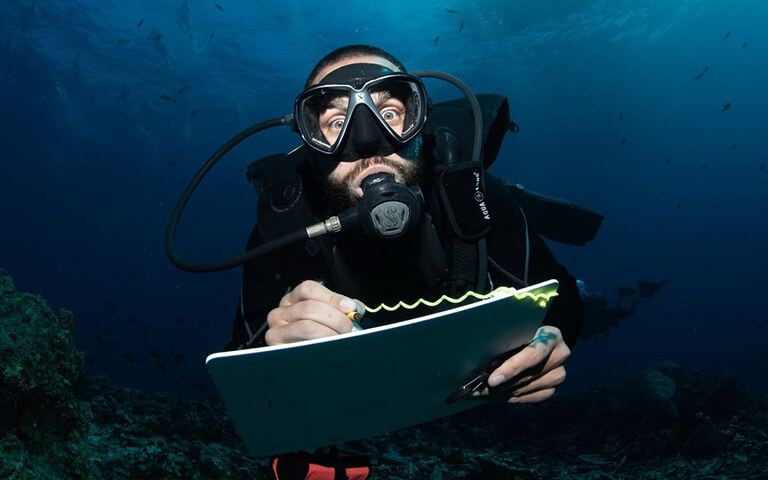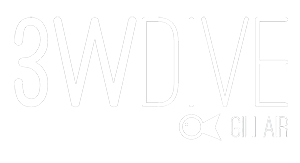by Margot McManus
As divers, it’s no secret we love the ocean. It’s also no secret that the ocean is facing serious risks towards its ability to sustain itself. Being an issue of a global scale, it’s easy to feel like there’s not much you can do to help. At 3W Dive, we believe that as people who enjoy the ocean and get to call it home, we have a responsibility to change the way we interact with our environment if we want to see it thrive. Here are some tips on sustainable scuba diving and how you can be a more eco-conscious diver; knowledge you can share with other divers to help protect the ocean.
Pick up trash on your dives
This may seem like an obvious one if you’re a seasoned diver, but the reality is that many people engaging in scuba diving are there for the experience without understanding how they can responsibly engage with their environment and do their part towards sustainable scuba diving.
If you see garbage on your dive, it’s totally ok to go out of your way to pick it up. In fact, you SHOULD be picking up any garbage that you see, and putting it somewhere safely in your BC. You can also bring along a mesh bag for putting garbage into and even a glove as an extra precaution. It’s still important to make sure the conditions are safe and that you don’t stray too far, so be sure to let your buddy know during your briefing that you’ll be picking up garbage.
Also very important, DON’T TOUCH ANYTHING that is not trash. You also don’t want to be picking up anything that has an animal in it. So be observant and cautious towards any garbage you’re touching while on a dive. This is a super important rule all divers should be following that we’ll expand on a little further down.
You can also bring a knife or wire cutter with you on your dives in case you encounter any nets or fishing line that may be tangled, just be sure to approach this cautiously as there could be hooks tangled in the line.
You can also bring a knife or wire cutter with you on your dives in case you encounter any nets or fishing line that may be tangled, just be sure to approach this cautiously as there could be hooks tangled in the line.
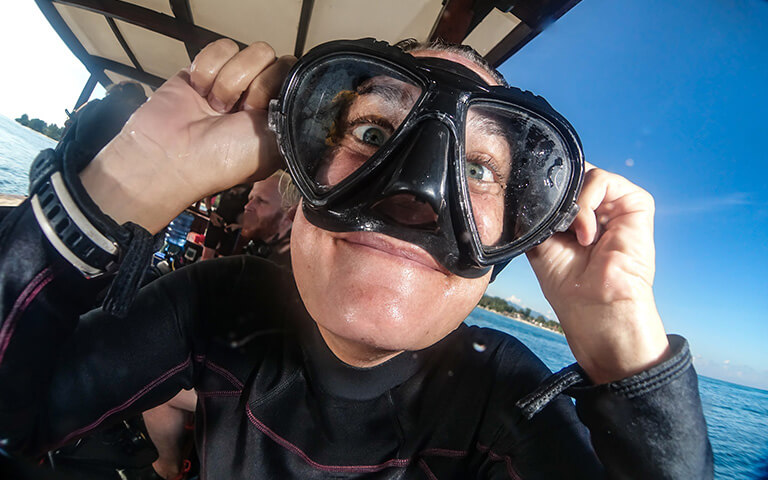
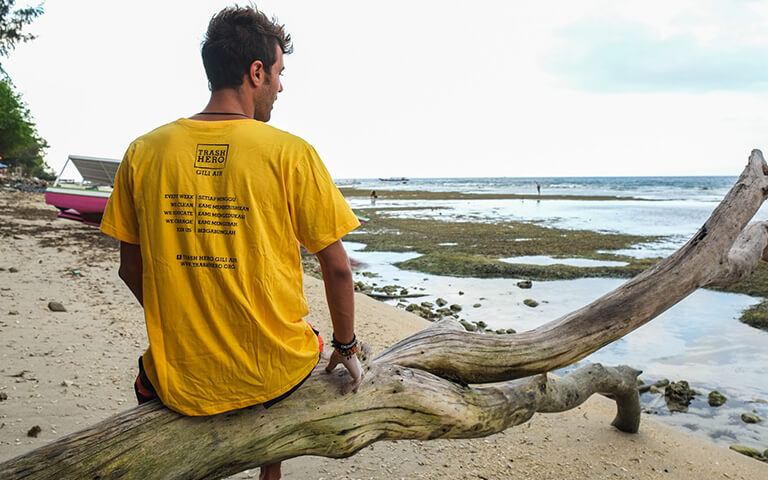
Protect the ocean by using reef-safe sunscreen
Studies show that chemicals found in most popular sunscreen products actually hurt corals. These chemicals have been found to decrease corals’ defenses against bleaching, damaging their DNA and hurting their development. The last thing we want to be doing while diving is bringing chemicals with us that are going to damage our marine environment.
Luckily there’s an easy solution to this problem. There are a growing number of reef safe sunscreen products to choose from, using alternative compounds that have been found to interact safely with marine life.
Dive shops will often be selling some, however this is never guaranteed. So be proactive and think about buying some before your trip to avoid running the risk of having to use any products that will have an impact on our oceans. At 3WDive we sell and use CocoAloha Surf if you want to check them out.
Dive shops will often be selling some, however this is never guaranteed. So be proactive and think about buying some before your trip to avoid running the risk of having to use any products that will have an impact on our oceans. At 3WDive we sell and use CocoAloha Surf if you want to check them out.
Sustainable Scuba Diving – Watch your buoyancy
This is a big one, and may be the most underrated tip. Buoyancy is a skill that is a lifetime practice for divers and one of the most important sustainable scuba diving practices. As much as we can try to master our buoyancy control, no one’s perfect.
Sometimes when we’re diving, we can accidentally kick up some sand or even break some coral and not even realize it. Coral is extremely delicate and will break very easily, so being aware of your surroundings, while also understanding your limits with your buoyancy control, is part of being an eco-conscious diver. Part of this means using your judgement on how close you should be getting to the reef depending on your buoyancy skills.
First thing you can do to work on this is to watch your fin kicks. It’s important not to move too quickly, because even sending a wave towards coral can be enough to break it. You can also try using frog kicks which usually create less impact. So move slow.
Another thing to be mindful of is your gear. Make sure it’s kept close to you and things like your pressure gauge aren’t dragging below you where it could come into contact with the reef. If you see this happening to other divers, be sure to gently let them know.
Having good buoyancy is also critical for any diver interested in shooting underwater photography. We would recommend investing in a buoyancy course before buying an expensive underwater camera. Too often we see divers with large cameras who rely on the ocean floor to support them while taking photos. Don’t be that guy.
Another thing to be mindful of is your gear. Make sure it’s kept close to you and things like your pressure gauge aren’t dragging below you where it could come into contact with the reef. If you see this happening to other divers, be sure to gently let them know.
Having good buoyancy is also critical for any diver interested in shooting underwater photography. We would recommend investing in a buoyancy course before buying an expensive underwater camera. Too often we see divers with large cameras who rely on the ocean floor to support them while taking photos. Don’t be that guy.
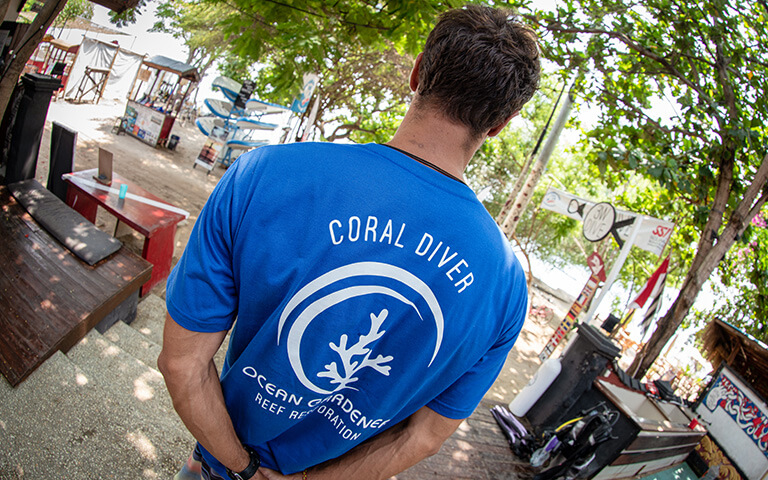
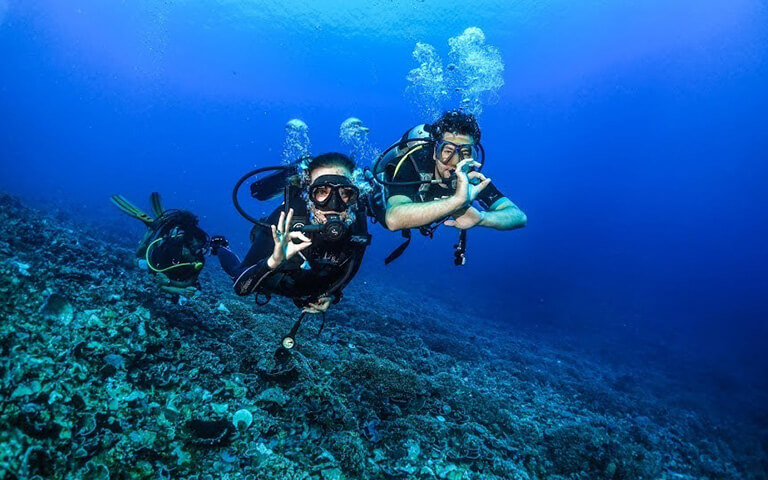
Help out those corals
This is something that isn’t practiced enough in the diving world, and even experienced divers often aren’t aware of these skills. But we can actually help out corals while we’re diving.
One way to do this is fighting sedimentation. Sedimentation has been found to be one of the primary stressors for coral species. This phenomenon is caused by coastal development, agriculture, and runoff. What you can do while diving is actually fan off sediment using your hands, waving them gently above the coral. You’ll see that sediment comes off. This allows for the coral to have better access to everything it needs in its environment.
Although this is handy knowledge, we believe that having the proper knowledge and understanding of corals and coral ecology are key factors in being able to efficiently help fight the problem. Taking the time to further educate yourself by taking an introductory course to coral farming for example, is a great first step towards being a conservation diver.
Marine conservation diving internships
As awareness for our environment grows, organizations and dive shops all around the world are partnering to develop educational and impactful programs. At the forefront of the movement are coral restoration and reef rehabilitation programs.
Coral education is a crucial step toward embarking on any reef rehabilitation projects, which is why we are offering a course about corals. This course aims to equip our divemaster interns with the necessary skills to dive further into coral farming and restoration practices, and learn techniques of being a more eco-conscious diver.
Learn more about our marine conservation diving internship and our dedication toward teaching divers about corals and ecosystem restoration, and sustainable scuba diving practices that protect the ocean.
